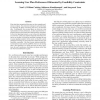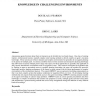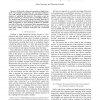140 search results - page 10 / 28 » Possibilistic Planning: Representation and Complexity |
JAPLL
2008
13 years 8 months ago
2008
In this paper, we study the following basic problem: After having executed a sequence of actions, find a sequence of actions that brings the agent back to the state just before th...
AIPS
2009
13 years 10 months ago
2009
It has long been recognized that users can have complex preferences on plans. Non-intrusive learning of such preferences by observing the plans executed by the user is an attracti...
IJRR
2010
13 years 7 months ago
2010
Partially observable Markov decision processes (POMDPs) provide a principled, general framework for robot motion planning in uncertain and dynamic environments. They have been app...
CI
2005
13 years 8 months ago
2005
Autonomous agents that learn about their environment can be divided into two broad classes. One class of existing learners, reinforcement learners, typically employ weak learning ...
IROS
2007
IEEE
14 years 3 months ago
2007
IEEE
Abstract— Real-world robotic environments are highly structured. The scalability of planning and reasoning methods to cope with complex problems in such environments crucially de...



